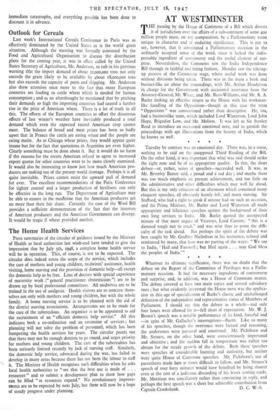AT WESTMINSTER
THE passing by the House of Commons of a Bill which divests it of jurisdiction over the affairs of a sub-continent of some 400 million people must, on any computation, be a Parliamentary event unique in character and of enduring significance. This is not to say, however, that it constituted a Parliamentary occasion in the ordinarily accepted sense of the word, since it lacked the indis- pensable ingredient of controversy and the useful element of sur- prise. Nevertheless, the Commons saw the India Independence Bill through in faithful and fitting fashion. Monday saw the tidying- up process of the Committee stage, where useful work was done without divisions being taken. There was in the main a brisk and businesslike air about the proceedings, with Mr. Arthur Henderson in charge for the Government with occasional assistance from the Attorney-General, Mr. Wyatt, and Mr. Rees-Williams, and Mr. R. A. Butler making an effective return to the House with his workman- like handling of the Opposition—though in this case the term " Opposition " was conventional rather than descriptive. He, too, had a businesslike team, which included Lord Winterton, Lord John Hope, Brigadier Low, and Mr. Molson. It was left to Sir Stanley Reed to introduce an occasional emotional note, and to garnish the proceedings with apt illustrations from the history of India, which he knows so well.
* * * * Tuesday by contrast was an emotional day. There was, in a sense, nothing to be said on the unopposed Third Reading of the Bill. On the other hand, it was important that what was said should strike the right note and be of an appropriate quality. In this, the short debate—or, rather, series of speeches—succeeded well. It was, as Mr. Beverley Baxter said, a proud and a sad day ; and maybe there was too much emphasis on present achievement, and too little on the administrative and other difficulties which may well lie ahead. But this is my only criticism of an afternoon which contained many eloquent speeches, all obviously keenly felt, and many moving. Sir Stafford, who had a right to speak if anyone had on such an occasion, and the Prime Minister, Mr. Butler and Lord Winterton all made appropriate and felicitous speeches against the background of their own long services to India. Mr. Butler quoted the unexpected minute of that most august of Viceroys, Lord Curzon : " this is a damned tough nut to crack," and was wise thus to point the diffi- culty of the task ahead. But perhaps the spirit of the debate was best caught by Mr. Godfrey Nicholson in his insistence, echoed and reinforced by many, that here was no parting of the ways: " We say to India, ' Hail and Farewell ; but Hail again . . . may God bless the peoples of India." * * Whatever its ultimate significance, there was no doubt that the debate on the Report of the Committee of Privileges was a Parlia- mentary occasion. It had the necessary ingredients of controversy and surprise, and, in addition, was a House of Commons matter. The debate covered at least two main topics and several subsidiary ones ; but what evidently interested the House most was the applica- tion in this age of specialisation of Burke's classic and unchallenged definition of the independent and representative status of Members of Parliament. I should say that the debate as a whole—and only four hours were allowed for it—fell short of expectation. Mr. W. J. Brown's speech was a notable performance of its kind, forceful and —in spite of Mr. Gallacher's interruptions—fluent. Like so many of his speeches, though the overtones were factual and reasoning, the undertones were personal and emotional. Mr. Pickthorn and Mr. Strauss, on the other hand, were conscientiously impersonal and objective ; and the sudden fall in temperature was rather too abrupt for the steady growth of the debate. Both these speeches were speeches of considerable learning and authority, but neither were quite House of Commons speeches. Mr. Pickthorn's use of parenthesis made him at times difficult to follow, and Mr. Strauss's speech of over forty minutes would have benefited by being shorter even at the cost of a judicious discarding of his lesser scoring cards. Mr. Morrison was conciliatory rather than convincing in reply, and perhaps the best speech was a short but admirable contribution from
Captain Crookshank. D. C. W.-S. .


































 Previous page
Previous page